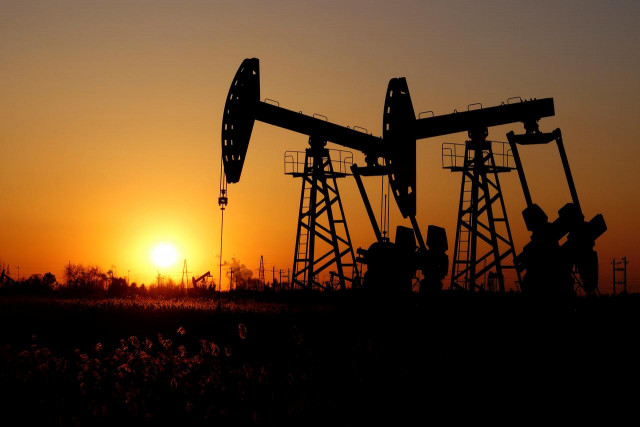Regional tensions - a threat to oil-importing nations
Fears grow over disruption to crude supplies in the Middle East

PHOTO: REUTERS
The benchmark Brent crude rose 3.55% to $68.60 per barrel following the US air strike in Baghdad that killed a top Iranian military commander on Friday.
In response, Iran has warned of a crushing revenge anytime, anywhere and in any form as tensions are boiling over, which may send crude oil prices soaring.
“Pakistan’s economy is heavily dependent on energy imports. It may encounter an oil crisis if the price touches $70 a barrel in world markets, but it (economy) will be in a much tougher situation as soon as the crude goes above $70,” Arif Habib Limited Head of Research Saimullah Tariq said while talking to The Express Tribune.
After top commander's killing, Iran virtually pulls out of nuclear deal
The situation in the region may lead to a spike in international oil prices and poses a threat to all the economies banking on oil imports.
“This (US-Iran conflict) is happening in the Persian Gulf where the world’s most strategically important sea passage for oil transportation – the Strait of Hormuz – is located. Pakistan is in the neighbourhood and if the maritime route is affected, our ports may also face a difficult situation,” he said.
The choking and blocking of the Strait of Hormuz – as part of tense world politics – will bring to a halt the import of oil, coal and liquefied natural gas (LNG) by Pakistan.
“Our economy is entirely dependent on imported energy. We may face power blackouts and meltdown of the economy,” Tariq warned. “If war breaks out in the region, it will badly impact Pakistan like the way it faced repercussions of the US war in Afghanistan.”
Pakistan meets over 70% of its energy needs through imports. Energy imports account for one-fourth of the total import bill of $19.21 billion in first five months (Jul-Nov) of the current fiscal year. It also carries a significant weight in the inflation reading.
Any further hike in international crude oil prices will force the Pakistan Tehreek-e-Insaf (PTI) government to pass the increase on to consumers of petroleum products. Transportation cost will also go up.
These all will accelerate the pace of inflation, push the central bank to increase the benchmark interest rate beyond the eight-year high of 13.25% - where it currently stands - and may trigger volatility in the rupee-dollar parity.
These, in turn, will shatter business confidence, discourage domestic and foreign investment and cause further slowdown in the national economy, which stood at a nine-year low of 3.3% in the previous fiscal year ended June 30, 2019.
Tariq said his research house had already anticipated that inflation would touch a new peak at 13.25% in January as the government had increased petrol and electricity prices while a surge in gas prices was on the cards.
'Pakistan won’t get embroiled in US-Iran conflict'
Commodity analyst Adnan Agar cautioned “if the escalating political tensions take the Mideast region to the brink of war, crude oil prices will shot up above $100 per barrel.”
Consequently, “inflation will surge in Pakistan and to control that the central bank will further jack up the benchmark interest rate, though some experts earlier expected a cut in the key policy rate in March onwards,” he said.
Agar pointed out that oil marketing companies were selling petrol at Rs117 per litre while the crude price hovered around $60-65 per barrel in the world market.
Pakistan needs to build big oil reservoirs to stave off the threat in future. At present, Agar said, the country kept oil reserves for only two to three weeks against stocks for five years in the US and for two to six months in most of the countries around the world.
Apart from the confrontation in the Middle East, the controversy over the North Korea nuclear arms programme is set to resurface in world politics anytime. This will also impact crude oil prices in the global market.
Tariq added that the situation in Iraq was also deteriorating as foreigners were leaving the country, which may keep oil prices at elevated levels. Iraq produces 4.8 million barrels of oil per day, out of the total 31 million barrels produced by members of the Organisation of the Petroleum Exporting Countries (OPEC).
“A one to one-and-a-half-million-barrel disruption in oil supplies (among OPEC member countries) will adversely impact Pakistan’s economy,” he said.
Pakistan has estimated average oil price of $60 per barrel in FY20. Based on that, it projected inflation reading of 11-12% and economic growth of 3.5% in the ongoing fiscal year, he said.
Pakistan imports Arab Light crude from countries in the Middle East. Brent crude crossed $60 per barrel in early October, rose above $65 in the last week of December and maintained the uptrend to date. Economic managers in Pakistan strongly expect a downward trend in international oil prices in FY20 but they also sometimes fear a return to the uptrend.
“We forecast Arab Light to be at $65 per barrel in FY20,” Taurus Securities said in a detailed report titled “Pakistan Investment Strategy 2020 – Pick and Choose” issued recently. “The World Bank is forecasting a decline in crude oil prices in CY20.”
Experts, however, expect Iran to exercise restraint under international pressure and the situation to de-escalate in the region in one week to 10 days.
The writer is a staff correspondent
Published in The Express Tribune, January 6th, 2020.
Like Business on Facebook, follow @TribuneBiz on Twitter to stay informed and join in the conversation.



















COMMENTS
Comments are moderated and generally will be posted if they are on-topic and not abusive.
For more information, please see our Comments FAQ